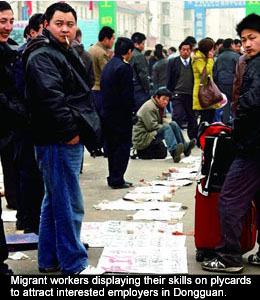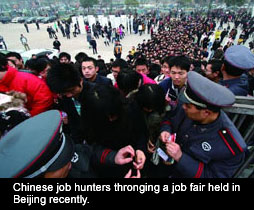Faces Amidst the Downturn
Reported by Yan Yong, Yang Xingyun, Chen Zhouxi, Xie Liangbing
Abridged translation by Liu Peng, Tang Tang
Original Article: [Chinese] [Chinese] [Chinese] [Chinese]
The worst economic downturn in over a decade has rocked China's already tight job market the nation over.
From Beijing in the north to Pearl River Delta industrial zones in the South, migrant workers and fresh graduates alike are scrambling for jobs, let alone ones that meet their expectations.
Though official data showed that last year's unemployment rate stood at 4.2%, a survey by the Chinese Academy of Social Sciences put the rate at 9.4%. The gap was the result of different methods of sampling and calculation methods. Behind all these conflicting statistics, though, are the faces behind the economic downturn - individuals who strove to make a living, to fulfil personal aspirations, or just to survive.
Behind all these conflicting statistics, though, are the faces behind the economic downturn - individuals who strove to make a living, to fulfil personal aspirations, or just to survive.
Economic Observer reporters recently trekked around China to collect personal anecdotes from various job hunters, with emphasis given to migrant workers and fresh graduates, groups which have been identified by Chinese leaders as some of the most vulnerable groups in a tight job market.
Here are their stories.
Li Xiaoyong, 23
Place of origin: Xinjiang province
Job Hunting Location: Beijing
Li Xiaoyong quit after his first day at work. "The company is awful, I have neither a computer nor a desk, and the supervisor is uneducated," he said of the advertising firm.
He arrived in Beijing last May without completing his studies in tourism management. He was too eager to get started at a dream job in the capital, far and away from his impoverished town in Xinjiang province.
After several failed attempts at "prestigious" companies, he began to set eyes on smaller firms, which offered between 800 to 1,500 yuan a month in compensation. He took on a few jobs but none was satisfactory, and he always quit prematurely.
"The salary was too low, the company was not good and I didn't believe I had a future working there," Li said.
Li criticized a kind of career service support his college offered, which helped fresh graduates find jobs at restaurants and hotels.
Li eventually joined the ranks of the Beipiao or Beijing drifters- aspiring youngsters with an inclination towards the arts and intellect fields. He lived in an urban village, a slum located on the city fringes and overshadowed by highrises. As his days of unmployment dragged on, his spirits dwindled.
Li's father, who had been supporting him financially, summoned Li home several times. The father said he had helped Li secure a post in a local government agency, but Li resisted the offer.
"I must keep on looking no matter how tough it is because I will not be able to come back to Beijing once I go home," Li said.
Xu Lan, 23
Place of Origin: Kai County, Chongqing
Job Hunting Location: Shenzhen
A day after the Lunar New Year ended, Xu Lan and her 28-year-old husband jumped into a friend's car and endured a bumpy, 30-hour ride to Shenzhen, where they had been working for a few years.
But there were no definite jobs awaiting them in Shenzhen, the export-oriented manufacturing hub in South China.
Xu had late last year quit his job as a travel booking salesperson due to lowered commissions, and went home to get married. Back then, her husband still enjoyed a moderate income from his job at a goods delivery service, which had since been in decline too.
Despite the uncertainties ahead, the couple was adamant to leave their mountainous hometown for the coastal city, as money-making opportunities were limited there.
"We'll see what we can get. We'll take whatever is offered. Times are tough, and we must not set high hopes," said Xu, who has been diligently checking job advertisements pasted on windowpanes around the city.
Unlike many other migrant workers who hopped from one place to another depending on the availibity of jobs, Xu deemed herself lucky to have stuck to one job for four years. In her last job, Xu used to earned slightly over 2,000 yuan a month, and led a rather modest single lifestyle.
Upon returning to Shenzhen after a few months break, Xu embarked on job hunting for the first time in years. Recently, Xu and her husband were paying 300 yuan a month for a two-bedroom unit in an urban village, sharing it with four other migrant families.
Shared renting was common among migrant workers, said Xu, adding that each family used curtains as a partition to carve out their own private spaces.
Hu Liangping, 18
Place of Origin: Sanhe village, Guizhou province
Job Hunting Location: Dongguan, Wenzhou
After hearing it would be easier to find a job in a shoe-making factory in Wenzhou, the cradle of China's private economy, Hu Liangping gave up his plan to return to Dongguan, where he had worked for three years, after the Lunar New Year holidays.
Once in Wenzhou, however, he found the ground reality to be quite different than they had hoped. The industrial parks there were lifeless and many factories had cut production due to a sharp decline in orders.
When walking around the industrial park on February 10, he found job posts on factory gates recruiting only 50 workers, offering a monthly pay of 1,200 yuan. And there were many others like him also looking for work.
He also learned that some factories in Wenzhou imposed a 10-hour work day instead of the eight-hour standard in Dongguan.
In addition, there were fewer cyber-cafes and games centers, where he usually spent his spare time.
Though dissapointed, Hu said he had no intention to go home. "Although I am just a passer-by in this city, I am also a 'guest' in my hometown," he said, adding that he would go on seeking out new places until he was settled somewhere that offered him satisfactory job and lifestyle.
Gu Tongchou, 45
Place of Origin: Sanhe village, Guizhou province
Job Hunting Location: Wenzhou
While his family and friends were still celebrating the Spring Festival back home, Gu Tongchou had made his way thousands of kilometers away to Wenzhou, on the fifth day of the Lunar New Year.
He landed a job at a shoe-making factory, which paid him 1,600 yuan per month.
As a father of three schooling children, and a filial son of his aging parents, his financial commitments were high. He claimed that his children's education alone would have cost 40,000 yuan a year.
Gu lived on the basics, and conserved most of his earnings for his family. He would walk for an hour to and from work in order to save the four yuan in daily bus fare.
"It's all for my kids," Gu said of the strength in his perseverance.
Gu said he had worked in Wenzhou for four years and did not face great difficulties in finding a job this year, despite that many firms have cut or delayed production.
"It's easier to find a job if you cut short your holiday and come back to work when others are still feasting," Gu said of his decision to forgo family gathering - which is rare and usually once a year during the Spring Festival - to improve his job hunting prospects.
He believed there were still many jobs out there, albeit not as abundant as they used to be, but with the right attitude, one would have no problem landing one.
Gu said he dreamt of the day to finally leave the city for good and go home to do farming. "The day when my kids find their own jobs," he added.
Zou Chunping, 30
Place of Origin: Zoujia village, Jiangxi province
Job Hunting Location: Wenzhou
Zhou Chuping has been visiting Wenzhou's job center every morning at seven for the past two months, but he has yet to get lucky and become gainfully employed.
His daily routine of job hunting started after the closure of his former factory in Taizhou city, Zhejiang province.
The job center had become a popular hangout for unemployed migrant workers since last September, said Zhou. He added the migrant workers, though strangers to each other and from different places, were mutually affable at the center.
He said the job hunters would team up and share the rent for a room at a hotel near the job center. They usually packed in six to a room, each paying five yuan.
Zhou said the majority of his fellow job hunters were in their 30s, but mostly remained single. "We were just laborers who could never earn enough money. Rural girls have become very materialistic nowadays," Zhou reasoned why so many migrant workers were bachelors.
For survival, Zhou said he would take on odd jobs in between while waiting for a permanent one to come by.
Qiu Hanwu, 29
Place of Origin: Guangxi province
Job Hunting Location: Dongguan, Guangdong province
Qiu Hanwu had been shuttling between Shenzhen and Dongguan for over 10 days visiting six job fairs. Yet little progress was made.
He felt puzzled and dejected. As a skilled worker, he had never faced such difficulty in landing a job before.
Previously, Qiu was with a Taiwanese-invested hardware firm.
He had worked with the company since completing technical middle school seven years ago. His salary climbed from 1,000 to 4,000 yuan a month as his skill matured.
Last year, his Taiwanese boss promised him a rotation to Taiwan, where he could improve his management skills and be promoted.
Just as his dream of a brighter future was spreading out in front of him, the factory skidded into bankruptcy, spurred by a sharp decline in orders in the second half of 2008.
Suddenly, Qiu lost his job, and found himself starting all over. Though he originally thought it would be easy for him to find a new position with the same pay as before, however, a ten day stretch of job hunting made him realize how fragile his accumulated experience was.
Qiu now wants to find a creditworthy company rather than a small, risky one. "It would be devastating if, after I already started working, the firm went under and I didn't get paid. I would rather have stayed home," Qiu said.
The views posted here belong to the commentor, and are not representative of the Economic Observer |
Related Stories
Popular
Briefs
- OPhones to Take on iPhone
- The 3G-enabled Lenovo Mobile OPhone is likely to provide stiff competition to Apple's iPhone in the China market.

- Source:China Mobile
- 6.4-Magnitude Quake Rocks West China
- A 6.4-magnitude earthquake struck China's western Qinghai province earlier this morning.
- Source:China Earthquake Networks Center

- TAX
- Taxing Times
- China's tax bureau aims to collect an additional 100 billion in tax before the end of the ...




















